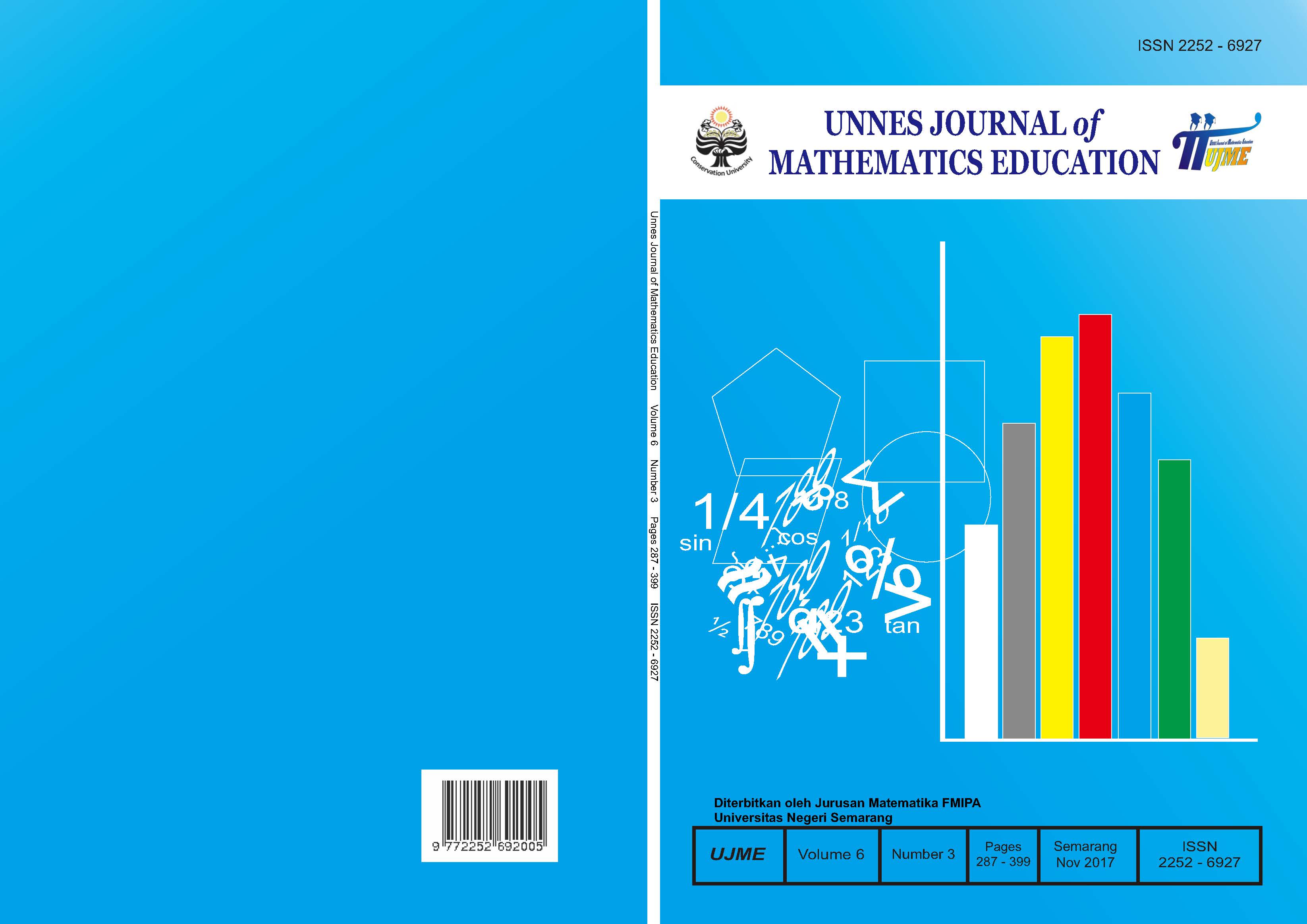The Effectiveness of SSCS Learning Model with KNWS Strategy towards Mathematical Creative Thinking Ability and Self Confidence of Students
##plugins.themes.academic_pro.article.main##
Abstract
Type of this study is quantitative. The purpose of this study was to determine the effectiveness of SSCS learning model with KNWS strategy towards mathematical creative thinking ability and self confidence of students. The populations of this study was students at grade VIII SMP Muhammadiyah 8 Semarang academic year 2016/2017. The sampling was done by cluster random sampling technique, which were chosen VIIIA as experiment class and VIIIC as control class. Data collection methods used documentation, a test, a questionnaire, and an observation. The result of this study stated that the mathematical creative thinking ability of the experiment class students had reached the classical completeness, percentage of mastery learning on mathematical creative thinking ability of the experiment class students was better than that percentage of the control class students, average of test result on mathematical creative thinking ability of the experiment class students was better than that average of the control class students, average of self confidence score of the experiment class students was better than that average of the control class students, teacher ability and the learning activities at the experiment class students included in good category, response of the experiment class students to joint the learning is positive.
##plugins.themes.academic_pro.article.details##
References
Depdiknas. (2006). Tentang Kurikulum Tingkat Satuan Pendidikan (KTSP). Jakarta: Depdiknas.
Dimyati & Mudjiono. (2002). Belajar dan Pembelajaran. Jakarta: Rineka Cipta.
Ghufron, N.M. & Risnawati, R.S. (2011). Teori-teori Psikologi. Jogjakarta: Ar-Ruzz Media.
Munandar, U. (1999). Mengembangkan Bakat dan Kreativitas Anak Sekolah. Jakarta: Grasindo.
Munandar, U. (2009). Pengembangan Kreativitas Anak Berbakat. Jakarta: Rineka Cipta.
Pehkonen, E. & Helsinki. (1997). The State-of-Art in Mathematical Creativity. Zentralblatt fürDidaktik der Mathematik (ZDM)–The International Journal on Mathematics Education, 97(3), 63-67. [Online] Tersedia:http://www.emis.de/journals/ZDM/zdm973a1.pdf. [16 Februari 2017]
Pizzini, E.L. & Shepardson, D.P. 1992. A comparison of the classroom dynamics of a problem-solving and traditional laboratory model of instruction using path analysis. Journal of Research in Science Teaching, 29 (3), 243-258.
Sapto, A.D., Suyitno, H. & Susilo, B.E. (2015). Keefektifan Pembelajaran Strategi REACT dengan Model SSCS Terhadap Kemampuan Komunikasi Matematika dan Percaya Diri Siswa Kelas VIII. Unnes Journal of Mathematics Education, 1(2): 81-86. Tersedia di http:journal.unnes.ac.id/sju/index.php/ujmer/ article/download/ 636/621 [diakses pada 29 Januari 2017].
Septiana, M., Mashuri & Agoestanto, A. (2012). Keefektifan Model TGT berbantuan CD Pembelajaran Rekreatif terhadap Motivasi dan Hasil Belajar. Unnes Journal of Mathematics Education, 1(2): 16-21. Tersedia di https://journal.unnes.ac.id/sju/index.php/ujme/article/download/1096/1625 [diakses pada 16 Juli 2017].
Sugiyono. (2015). Metode Penelitian Pendidikan. Bandung:Alfabeta.
Undang – Undang Republik Indonesia Nomor 20 Tahun 2003. Jakarta: Depdiknas.
Zulkarnain. (2015). Pengaruh Model Pembelajaran Search Solve Create Share (SSCS) Terhadap Kemampuan Menyelesaiakn Soal Cerita Matematika Siswa Kelas VIII SMPN 14 Kota Pekanbaru Tahun Pelajaran 2014/2015. Proceeding: 7th International Seminar on Regional Education, November 5-7, 2015. FKIP UR
